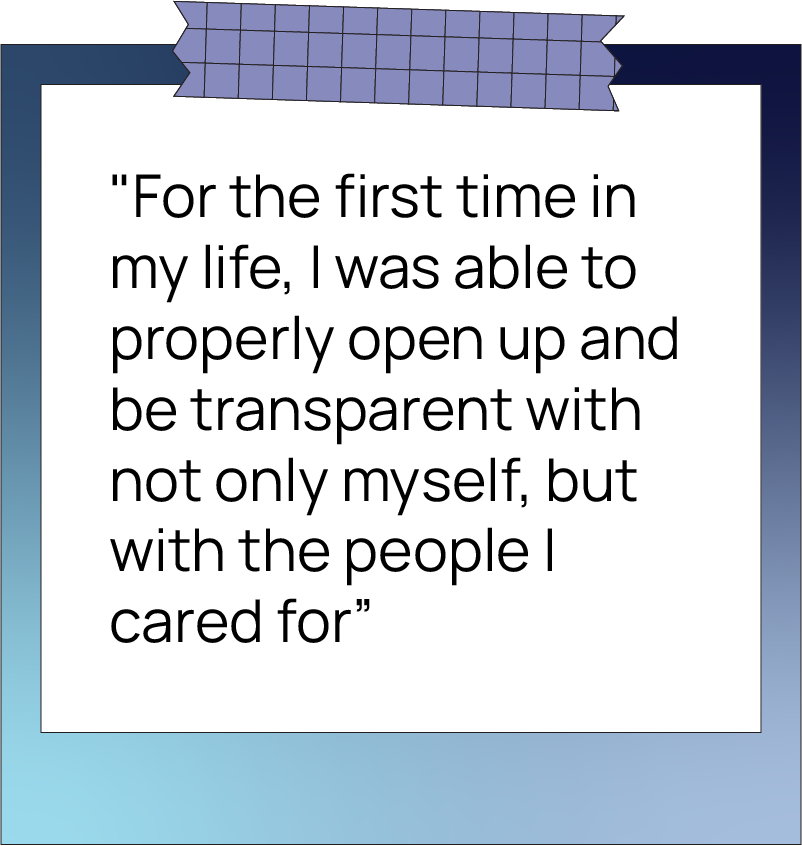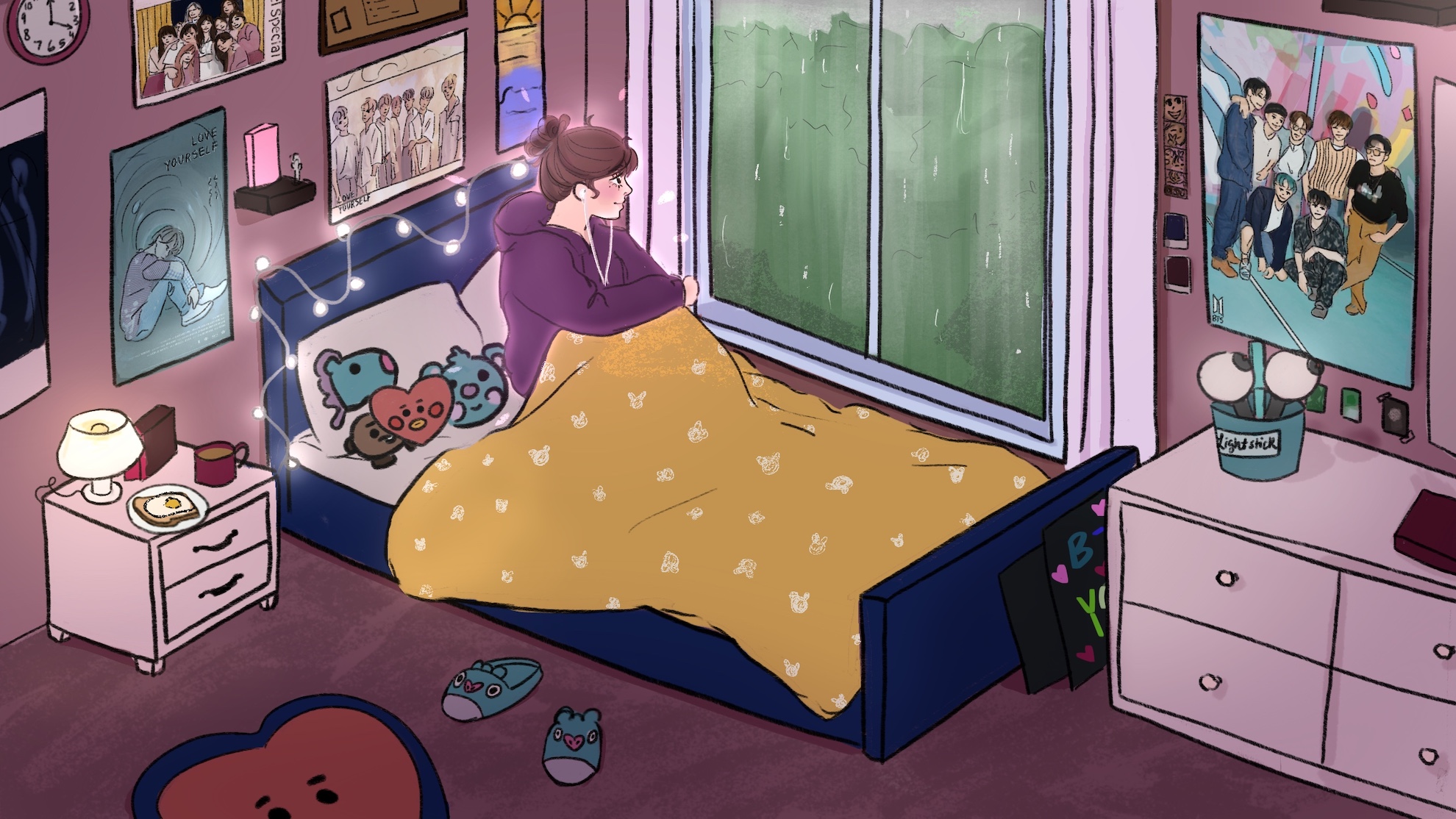Content Warning: This article discusses topics containing anxiety and eating disorders.
It was nearly 3 a.m. one night last March when I found myself shaking from anxiousness at my desk in my room, which I hadn’t left for days. I had vomited as a result of my binge-eating and was struggling to finish a final paper. On top of that, I was grieving the death of my uncle, who had passed away just three days prior.
I’ve always been independent from a young age as a result of living in a single-parent household, where the need to take on more responsibilities and mature faster was essential. And because I was always alone, the ability to be vulnerable with others was always a challenge for me. The only times I truly felt safe and encouraged to do things I enjoy was when I was with my uncle, who I now no longer had.
Feeling numb and too hurt to socialize, I deleted all my social media applications and barely spoke to any of my close friends for weeks; I had always conditioned myself to suffer alone as a result of my fear of abandonment. While I couldn’t reach out for help, I still needed a quick remedy to distract myself from triggering another anxiety attack.
Forcing myself to take a break from writing my paper, I clicked through YouTube’s homepage and found a compilation video titled, “BTS are full time comedians.” With over 4 million views, I quickly pressed play and found myself escaping reality as I laughed at multiple clips of a group of seven K-pop idols just being themselves. Fascinated by how comforting their content was, I was curious and became eager to dig deeper into the popular boy group that some of my best friends and millions of others adored.

As a veteran K-pop listener, I grew up on old-school groups like Shinee and Girls Generation, but BTS was never a group that stood out to me until recently.
Never being able to talk about the struggles and the repercussions of living within an emotionally taxing household has always made it hard for me to come to terms with and validate my anxiety disorder. When I started learning more about BTS, a group that took eight years to reach such heights of fame and were open about their mental health and well-being, I was taken aback by their vulnerability and ability to connect with their fans at a personal level.
The idols that I looked up to as a child were merely visages augmented by the industry standard to appeal rather than to connect with audiences. But BTS wasn’t like them; they were genuine, open and welcoming.
One day, during one of my daily online strolls through BTS’ videos, I stumbled across their 2018 United Nations speech. I began attentively listening to BTS’ leader, Kim Namjoon, speak on the importance of promoting self-love messages amongst youth.
"Like most people, I made many mistakes in my life,” Kim had said eloquently. “I have many faults and I have many fears, but I am going to embrace myself as hard as I can, and I’m starting to love myself, little by little.”
As these words left his mouth, I reflected back on my uncle’s death and finally validated the regretful feelings I had toward knowing that this was not how he wanted me to live out my life—in constant fear of trusting others and thinking lowly of myself.
BTS has had a huge impact on my life and self-image. A 2020 Malaysian study that evaluated the meaning of being a K-pop fan thoroughly describes the unique parasocial relationship that exists between fan and idol. “Although fans may not know idols personally and are fully aware of that, it creates a strong personal bond and attachment,” the study reads. “Taking into consideration, the sheer amount of consumable content also makes it easy to be immersed for hours. Although it is one-sided, it is significant and proves that the K-pop fan transcends musical discussion.”
I realized the connection between my mental health and the content I consumed impacted how I viewed myself. BTS’ words encouraged me to openly speak up about my mental health to my best friends. I slowly started taking steps towards caring for myself and began online counselling. While hesitant at first, I knew I had to confront my emotions head on.
One day, my counsellor asked me what my interests were and suggested I indulge in them. Frankly, as someone who was falling behind in school and had begun to loathe the major that was once my driving passion, nothing else came to mind besides BTS. Unphased by what I thought was a ridiculous answer, she told me to incorporate the aspects I enjoyed about them into my everyday life.

If I didn’t feel like eating, I turned to “Eat Jin” videos, a series of mukbangs—also known as an online eating show—with the eldest BTS member Kim Seokjin. He would display his meal of the day and encourage fans to eat along, while reflecting on the problems he used to face being on strict diets as an idol.
When watching their variety show Run BTS, I’d excitedly invite my best friends over to hang out while suggesting we do similar activities like playing an over the top mafia game or battling it out in a tag team ramyeon cooking challenge. The brotherly bond I saw amongst the seven members motivated me to want to solidify and strengthen the weak relationships I had with my friends and family members.
For the first time in my life, I was able to properly open up and be transparent with not only myself, but with the people I cared for.
Reflecting back on the past year I’ve had since BTS came into my life, I find myself understanding their message of loving yourself more and more. Seeing an artist share almost all aspects of their life (good and bad) without hesistantancy provided me with comfort and a sense of belonging I never thought I’d have growing up alone.

According to the aforementioned study out of Malaysia, being fans of a K-pop group can offer this sense of belonging. “Fans also learn the values that are being shared within the community and conform to it,” the study adds.
Although there is still much room for growth, I’ve learned that self-improvement is dependent on your desire to continue the journey of learning to love yourself. Through watching these seven boys from South Korea grow up and go through various hardships, but still achieve such heights of success, it almost motivates me to do the same for myself.
This is what makes BTS different from any other celebrity I’ve seen before. They encourage self-love through their vulnerability and authenticity, which transcend traditional values of the K-Pop industry, and have allowed them to have a deep and long-lasting connection with their fans.
As emulated in their song, "Answer: Love Myself," the translated lyrics “you've shown me I have reasons I should love myself,” portrays a relationship between fan and artist that depends on one another. My growing dependence on BTS has shown me it is okay to depend on others, because once you allow people to love you, it can open a gateway of endless reasons to love yourself.
